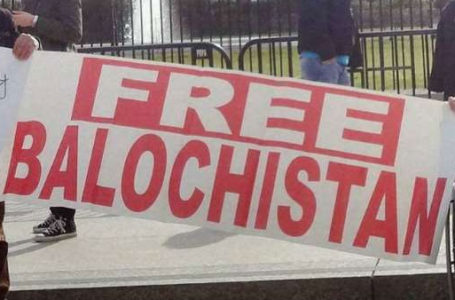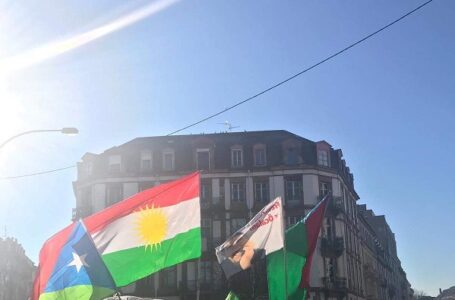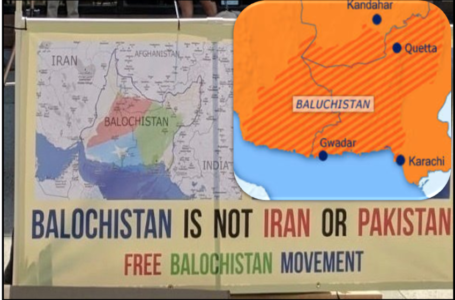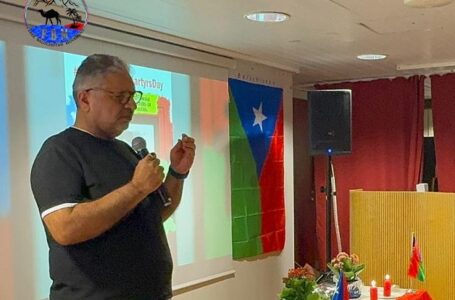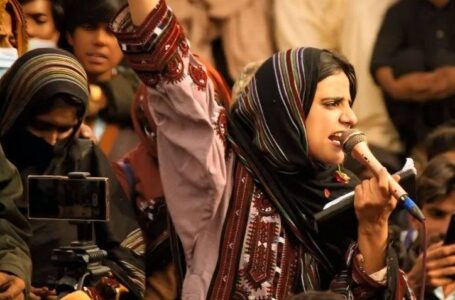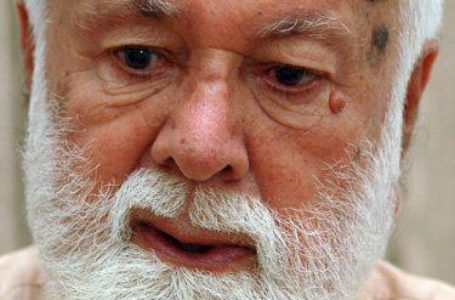Israel’s decisive Attack on Iran a Significant Opportunity for Baloch National Independence: FBM
Khatchatur I. Pilikian Obituary

By Desmond Fernandes
It is with great sadness that we heard of the passing away of Khatchatur I. Pilikian, a patron of Peace in Kurdistan, on 28th July 2019. Khatchatur was an indefatigable defender of human rights, a brilliant orator, an internationally acclaimed leading tenor and a sharp-edged public intellectual whose texts and presentations, like Chomsky’s, “share … a luminous theoretical, political, and forensic analysis of the functioning of the current global power structure[s], new and old modes of oppressive authority, and the ways in which neoliberal economic and social policies have produced more savage forms of global domination and corporate sovereignty”. Khatchatur was also a remarkable performing and recording musician, artist, poet, research scholar and university professor who lived and studied in Iraq, Lebanon, Italy and the USA before finally settling in London.
Amongst his many artistic and musical highlights, “as a leading tenor, he was invited to Armenia, where he made his debut in 1961, singing the role of Cavaradossi in Puccini’s opera Tosca, at the Spendiarian Opera Theatre of Yerevan. His award-winning painting Amore Eterno of 1961 graced the cover of the Vatican’s bi-weekly Crociata (no. 23). In 1962, Pilikian sang the part of Tancredi in the first performance of Virgiglio Mortari’s edition of Monteverdi’s Il Combattimento di Tancredi e Clorinda, produced at the Astaldi Palace in Rome, conducted by maestro Mortari himself. In the spring of 1963, he performed songs by Mussorgsky, Rachmaninoff and Komitas on Italian radio (RAI) accompanied at the piano by his tutor, maestro Giorgio Favaretto. It was the first Italian radio recording of Komitas songs”.
In addition to this, Khatchatur “created two roles in Mario Nascimbene’s TV-opera Faust a Manhattan, conducted by maestro Franco Ferrara and directed by Sandro Bolchi, which represented Italy in the International TV Festival Premio Italia 64. In 1967, his recital programme at the Purcell Room included twelve Komitas songs – a first performance in Britain. During the historic Paris student movements in1968, the cultural committee of the International House of the City University invited Pilikian to interpret a multi-cultural vocal recital, accompanied by the pianist J.H. Austbo and performed at the Grand Theatre of the University.
“Back in Yerevan, Pilikian was the tenor soloist in the first complete performance of Verdi’s Requiem in Armenia, January 1969, conducted by maestro Ohan Durian, at the Aram Khatchaturian Concert Hall alongside the Armenian National Philharmonic Orchestra … He received his Doctorate in 1975. In 1976, he joined the music faculty of Wayne State University (Michigan), where, in addition to his academic responsibilities as a pedagogue/performer with WSU faculty, now Professor Pilikian designed and directed an original university radio WDET-FM series entitled HARC-The Heritage of Armenian Culture …
“His epic poetry in English, with original illustrations in Chinese ink, titled Labour 100—Panegyric on Old-New-Future Labour, was published by Brentford & Isleworth Labour Party … He [also] contributed the entry ‘Music and Turner’ in the Oxford University Press encyclopaedic publication titled The Turner Companion. In January 2002, he took part, as a tenor soloist, with Cahit Baylav (violin) and Hassan Erraji (oud) in the Nazim Hikmet 100 Celebration Concert at Queen Elizabeth Hall … After several years teaching violin in schools around West London”, Khatchatur Pilikian retired and, in 2006, “produced and directed his original Audio-Visual Libretto, Harmonic Synthesis of Armenian Poems and Music, commissioned for the AGBU 100thAnniversary in Montreal, Canada … In November 2009, he was invited to Athens to mark the 140th birth anniversary of Komitas Vardapet (1869-1935), with a song recital, under the auspices of the Armenian Social and Cultural Centre of Athens, Greece”.
Alongside these considerable accomplishments, Khatchatur, whose parents were survivors of the Armenian genocide, produced several key political works, including refuting Terrorism – Seven Epistles From Diaspora, The Spectre of Genocide as Collateral Damage is Haunting the World, Free Zarakolu and his comrades-in-letters and human rights campaigners in Turkey,A birds-eye-view on the phenomena of Genocide and the Armenian experience of it,The Crime Against Multi-Cultural Civilisation and the book UNESCO Laureates:Nazim Hikmet and Aram Khatchaturian (Gomidas, London).
Many of Khatchatur Pilikian’s texts and presentations in the UK parliament and in other public venues and The Spokesman (the Bertrand Russell Peace Foundation periodical) addressed the need to support the persecuted and marginalised; recognise the form, nature, impacts and repercussions of Turkish state terror and the Armenian, Kurdish, Assyrian, Aramean, Greek and ‘Other’ (inclusive of Baloch) genocides, and the manner in which neoliberal and war-mongering agendas and interventions have normalised genocide in its various forms worldwide.
Khatchatur remained active with numerous organisations, including solidarity with the Victims of All Genocides, Stop the War, Liberation, the Bertrand Russell Peace Foundation, the Socialist History Society, the London Socialist Film Coop, the Peace in Kurdistan Campaign and Palestine and Venezuela Solidarity.
At a UK parliamentary meeting on 23rd November 2011 – sponsored by Michael Connarty MP with the support of Eilian Williams’Solidarity with Prisoners of Conscience in Turkey, the Kurdish Federation UK, KNK and the Peace in Kurdistan Campaign –he rose in defence of the Kurds and those targeted by state censorship, including the publisher Ragip Zarakolu (owner and director of Belge publishing house):
To grasp well the motives why the valiant intellectual and human rights publicist Zarakolu is now one of the latest victims of the oppressive Article 301 of the Turkish penal code, we have to appreciate the historical background of oppression, the oppressive rulers and their governments’ terror of the truthful word …
Nazim Hikmet continued to be imprisoned even in 1948, the year of the Universal Declaration of Human Rights, and also, most tellingly, of the Convention on the Prevention and Punishment of the Crime of Genocide. The Turkish people’s poet, the comrade-in-Arms and in-Lettres of Aragon, Mayakovski and Pablo Neruda, continued writing twelve volumes of verses, considered among the best in world literature, while in prison for nearly one-third of his entire life.
The poet warned his beloved people:
Your own hands hold this world
Oh, my working people
They feed you lies
While you are starving to death.
Nazim Hikmet’s voice rang loud and clear in the mid-20thcentury. [But] what is happening now in the 21stcentury is that an outspoken admirer of the poet Hikmet is raising his voice in support of the national ‘minorities’ of his homeland, Turkey. Furthermore, Ragip Zarakolu is denouncing, among others, the fascistic styled article 301…
Here is what Canadian Action has recently written on the Kurdish Conflict in Turkey:
“Since 1993, over 4,000 Kurdish villages have been destroyed and more than 17,000 killings of innocent Kurds have been carried out by the Turkish Special Forces. Following the March 29th2010 municipal elections, 1,500 politicians, intellectuals, elected representatives, mayors and human rights activists have been jailed to date. As unacceptable as it is, hundreds of Kurdish children have been killed by the Turkish Security Forces since 1993 and today, about 3,000 Kurdish children (aged 6 to 17) are in jail”.
What Canadian Action describes is nothing less than a latter-day enactment of the new Republic’s genocidal massacre in Dersim between 1937-1938, when the Turkish army, its land and air force, annihilated 80,000 mostly Alevi Kurds, including women, children and the elderly.
It is obvious, and sadly so, that the Turkish government relentlessly continues its undeclared war, yet again, against its own citizens, but failing, nevertheless, to “put out the people’s eyes”, particularly in this case, the Kurdish people’s eyes, or, for that matter, the Turkish people’s eyes too, as I tend to believe, having met personally the humanist and courageous Turkish intellectual, Ragip Zarakolu, here in London, sharing with him a platform at the House of Commons in memory of Hrant Dink, Zarakolu’s comrade-in-letters, assassinated by a fascist thug in 2007 …
Let us remember how dignified and emphatic the intellectual giant, Bertrand Russell, was in his Closing Address to the Stockholm Session of the 1967 War Crimes Tribunal on Vietnam, saying among others:
The long arduous struggle for decency and for liberation is unending. A Tribunal such as ours will be necessary until the last starving man [and woman] is fed and a way of life is created which ends the exploitation of the many by the few.
Wherever men [and women] struggle against suffering, we must be their voice …We will be judged not by our reputations or our pretences but by our will to act.
It is good to know that such an act was forged and an international committee was created in Paris, presided over by the poet Tristan Tzara, to campaign for the release of the imprisoned writer Nazim Hikmet. The committee succeeded. The poet was freed in 1950. But his odyssey continued. Hikmet tells us about the nature of his odyssey:
I went to the Forum
I convinced people anew
-Do not kill your brothers
-Do not be killed by your brothers
Down with the war
I believe Zarakolu and all his comrades-in-letters and all the human rights campaigners just recently imprisoned in Turkey have all gone to that same Forum for that same reason. Their odyssey now continues in prison.
Let us rage against this injustice and demand freedom for the Turkish people’s valiant humanist intellectual, Ragip Zarakolu, and for all his comrades-in-letters and all the campaigners for human rights who are the victims of the notorious Article 301. The latter’s place ought to be surely not in the Turkish Penal Code but in the dustbin of history, I humbly believe.
It was my privilege to speak alongside Khatchatur on many occasions and I was honoured when he wrote the epilogue to my book, The Kurdish and Armenian Genocides: From Censorship and Denial to Recognition? (2007, Apec, Stockholm) and discussed and analysed the findings of two more books of mine in the UK parliament (The Armenian, Assyrian, Greek, Kurdish and Greek Cypriot Genocides and the Politics of Denialism and Modernity, ‘Modernisation’ and the Genocide of Kurds and ‘Others’ in Turkey: ‘1915’ within its Pre-and-Post Historical Periods).
Khatchatur spoke on numerous occasions in the UK parliament about the Armenian genocide; the ongoing genocide and repression of the Kurds in Turkey and Iraq and the assassination of Hrant Dink and he was a key signatory of the 3rdAugust 2014 ‘Sinjar, Rabia and Zumar and the threat posed by ISIS Appeal’, which, amongst other things, had called on “all concerned members of the public and public interest organisations” to “raise their concerns over what is happening. Yezidis, women, Christians and ‘Others’ now face targeting by ISIS in a number of ways … We call on the international community to pass a resolution to protect the minorities but without cynically using ‘them’ to pursue the ‘deep political’ and publicly unaccountable geopolitical agendas of the ‘superpowers’. We call on all regional communities and democratic movements to stand united against ISIS. We call on everyone to try to stop their governments from directly or indirectly arming or supporting ISIS”.
Khatchatur was also instrumental in helping to launch ‘Friends of Belge Press: An Appeal to Solidarity’(Patrons: Professor Noam Chomsky and Rosie Malek-Yonan). In a UK parliamentary meeting marking the 60th anniversary of the Genocide Convention, he reflected upon the following:
Allow me to announce loud and clear, at the onset: that the alpha and omega of my reflections on Genocide remains this: that deep in my heart, I wish Armenians had no such experience to talk about. Indeed, I feel, perhaps I would even have been a happier human being if peoples all over the world, whether Congolese, Nama, Herero, Abyssinians, Armenians, Assyrians, Kurds, Jews, Palestinians, Greeks, Bulgarians, Poles, Serbs, Kosovans, [Native] Americans of the north and the Indigenous communities of the south, Timorese, Vietnamese, Cambodians, Rwandans, Darfurians, and alas many others had also no such terrorising experience.
But most importantly, I truly believe that our precious and only world will be a much better place to live and die for that matter if that ultimate state terrorism is banished out of existence for all times to come …
The crucial question remains: To prevent Genocide ever happening again, what kind of human relations should humanity aspire to? Perhaps the first step is what the brave Archbishop Desmond Tutu wants us to consider, saying: “If you are neutral in situations of injustice, you have chosen the side of the oppressor”.
Hence, the need to choose: to have or not to have a world cleansed of Genocide, that ultimate tool of the oppressor. Furthermore, let us also be aware that it is obscene to let a major inhuman calamity like Genocide monopolize intellectual resources to eventually establish an exploitative industry. Such an obsessive monolithic approach diminishes any cultural heritage – exactly what oppressors and Genocide perpetrators desire most …
UNESCO has been warning the world, for decades now, that the greatest shame of the current civilisation is the fact that thousands of children die of hunger every single day. Today, that number has reached the staggering 44,000 hungry children dying each day of the year, as if a Hiroshima bomb is unleashed every single day just to kill children.
I would like to pose the following: that the Goebbels’ of this world, “releasing the safety-catch of their pistols”- in modern parlance, cluster bombs & co, ill-Ltd – should also be seen responsible for the modern massacres of the innocents.
Can there be any doubt that this child cleansing is also the unmentioned genocide of humanity, ongoing and an authentic one at that, which surely is the outcome of our own socio-economic and industrial military system? … Meanwhile, billions poured into the pockets of the warmongers of modern metropolises. These warlords of Mammon would eventually thrive in an ‘Inorganic Paradise’- a ‘paradise’ void of universal human rights and sustained by legalised torture; glorification of violence geared towards maximising profit at any cost; xenophobic state terror protected with religious fervour. And, topping as if the macabre orgy, genocide has been already tested, for a century now, to become the collateral damage of its inorganically modernised and sweat-shopped ‘global village’ of hunger and debt.
In a heartfelt eulogy, writer, filmmaker, theatre director and performance/installation artist Vaughan Pilikian paid tribute to Khatchatur:
Uncle knew life was a gift … He carved out space in the world that was uniquely his own because his sense of purpose drove him to do so. He was a true and proud socialist. He was also a humanist. The two things were the same for him. He believed and lived a credo that is increasingly rare today.
Despite his cherished identity as an Armenian, he placed as the highest value the universality of being human. He believed in people and in what they could do. He saw through the world: right into its wounded heart. And he was moved by that sight and he did what he could to heal it.
He thought and wrote and acted with selfless moral conviction and piercing intelligence, to raise the lot of the downtrodden, to challenge injustice and to lift the human spirit out of darkness and confusion towards something clearer and brighter. And he did all of this for no reward beyond the fact of doing so.
He saw no other aim in human life but the fostering of what sparkled, what took us beyond ourselves, what made us worthy of the name ‘man’ or ‘woman’. And thus, in some sense, inevitably his life was one of resistance, in the true tradition of the outsider and the idealist. It had I think – and I hope he would forgive me for saying this – a kind of quiet heroism. Quiet, but enduring.
Uncle had a voice. How can a voice like an uncle’s ever falling silent? It doesn’t. It is eternal. Not only will it live with all of us, but it will also live beyond us. I will hold his memory dear in the dark and the light and in this difficult time, I draw on his transcendent example and tell myself what he would have said, which is: Go on. Live. Live, take courage and be at peace.
Professor Khatchatur I. Pilikian is survived by his beloved wife, Araxie, as well as their son, Vazken.
Desmond Fernandes is a genocide scholar and founding member of Peace in Kurdistan (since 1994) and the Campaign Against Criminalising Communities. Formerly a Senior Lecturer in Human Geography at De Montfort University, his works on refugee rights, ‘deep politics’, genocide and the criminalisation of communities have been translated into a number of languages. He is the author of Call it by its name: ‘Persecution!’ (BPCA: London, 2019); The Kurdish and Armenian Genocides: From Censorship and Denial to Recognition? (Apec: Stockholm, 2007); The Armenian, Assyrian, Greek, Kurdish and Greek Cypriot Genocides and the Politics of Denialism; Modernity, ‘Modernisation’ and the Genocide of Kurds and ‘Others’ in Turkey; Education, Human Rights Violations in Pakistan and the Scandal involving UNHCR and Christian asylum seekers in Thailand (BPCA: London, 2016, 3rd edition) as well as co-author of The Targeting of Minority ‘Others’ in Pakistan (BPCA: London, 2013) and The Education System in Pakistan: Discrimination and the Targeting of the ‘Other’ (BPCA: London, 2014). Two new books will shortly be released: The Persecution of Christians in Sri Lanka (BACA: London, 2019) and Unsilencing Balochistan (Take 3) and Other Essays on the Genocide of the Baloch.
This article was originally published by Peace in Kurdistan.

